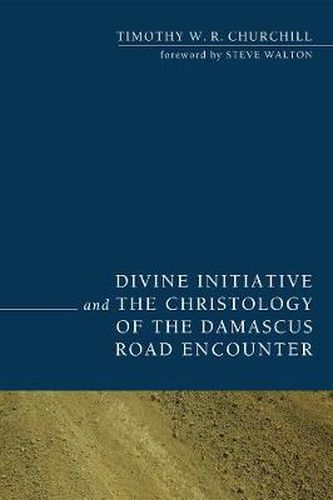Readings Newsletter
Become a Readings Member to make your shopping experience even easier.
Sign in or sign up for free!
You’re not far away from qualifying for FREE standard shipping within Australia
You’ve qualified for FREE standard shipping within Australia
The cart is loading…






This title is printed to order. This book may have been self-published. If so, we cannot guarantee the quality of the content. In the main most books will have gone through the editing process however some may not. We therefore suggest that you be aware of this before ordering this book. If in doubt check either the author or publisher’s details as we are unable to accept any returns unless they are faulty. Please contact us if you have any questions.
The Damascus road encounter between Jesus and Paul is foundational to understanding the early development of Christology, and, indeed, Christianity, since it is the first appearance of the post-ascension Jesus contained in the earliest Christian literature. This study examines the encounter as it is described in Paul’s epistles and the book of Acts. Since Paul interprets his experience within the Jewish tradition, this study begins with a survey of epiphany texts in the Old Testament and other ancient Jewish literature. This reveals two new categories for appearances of God, angels, and other heavenly beings: Divine Initiative and Divine Response. This survey also finds two distinct patterns of characterization for God and other heavenly beings. These findings are then applied to Paul’s accounts of his Damascus road encounter. Paul depicts the encounter as a Divine Initiative epiphany. This conclusion is significant, since it argues against the current view that the encounter was a merkabah vision. Paul’s Christology in the Damascus road encounter is also significant, since Jesus is characterized as divine. Such divine characterization is not typical for heavenly beings in first-century CE epiphany texts. Thus, a high Pauline Christology appears to be present at a very early point. The three accounts of the Damascus road encounter in Acts also fit the pattern of Divine Initiative–not merkabah–and exhibit the high Christology of Paul’s accounts. In fact, the three accounts in Acts are shown to form an intentionally increasing sequence culminating in the revelation that Paul was called to be an apostle by Jesus himself on the Damascus road.
$9.00 standard shipping within Australia
FREE standard shipping within Australia for orders over $100.00
Express & International shipping calculated at checkout
This title is printed to order. This book may have been self-published. If so, we cannot guarantee the quality of the content. In the main most books will have gone through the editing process however some may not. We therefore suggest that you be aware of this before ordering this book. If in doubt check either the author or publisher’s details as we are unable to accept any returns unless they are faulty. Please contact us if you have any questions.
The Damascus road encounter between Jesus and Paul is foundational to understanding the early development of Christology, and, indeed, Christianity, since it is the first appearance of the post-ascension Jesus contained in the earliest Christian literature. This study examines the encounter as it is described in Paul’s epistles and the book of Acts. Since Paul interprets his experience within the Jewish tradition, this study begins with a survey of epiphany texts in the Old Testament and other ancient Jewish literature. This reveals two new categories for appearances of God, angels, and other heavenly beings: Divine Initiative and Divine Response. This survey also finds two distinct patterns of characterization for God and other heavenly beings. These findings are then applied to Paul’s accounts of his Damascus road encounter. Paul depicts the encounter as a Divine Initiative epiphany. This conclusion is significant, since it argues against the current view that the encounter was a merkabah vision. Paul’s Christology in the Damascus road encounter is also significant, since Jesus is characterized as divine. Such divine characterization is not typical for heavenly beings in first-century CE epiphany texts. Thus, a high Pauline Christology appears to be present at a very early point. The three accounts of the Damascus road encounter in Acts also fit the pattern of Divine Initiative–not merkabah–and exhibit the high Christology of Paul’s accounts. In fact, the three accounts in Acts are shown to form an intentionally increasing sequence culminating in the revelation that Paul was called to be an apostle by Jesus himself on the Damascus road.